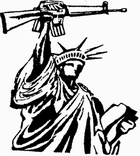Click Here to Puruse the old Flyover-press
Please Click ton Ab
Liberty knows no compromise
Click to Subscribe to Our Free Daily News Service
Donate today to help defray the costs of this important free newsletter
A Universal Ethic for All Mankind: A Detailed Review and Synopsis of The Ethics of Liberty
by Murray N. Rothbard
Chapter 4: Natural Law And Natural Rights
Compiled and Edited
by
Dr. Jimmy T. (Gunny) LaBaume
Historically, the great failing of natural-law theory is to have been profoundly statist rather than individualist—e.g. placing the focus of good and virtuous action on the State with individuals being strictly subordinate. However, John Locke, in seventeenth-century England , transformed classical natural law into a theory based on methodological and political individualism. It was this Lockean individualist tradition that strongly influenced the American revolutionaries. This book builds on this tradition of natural-rights libertarianism.
Granted, Locke's natural-rights theory was rife with contradictions and inconsistencies. The pioneers of any science suffer from inconsistencies that are corrected by those that follow. In fact, libertarian natural-rights theory continued to be expanded and purified after Locke. It culminated in the 19 th century with the works of Herbert Spencer and Lysander Spooner.
The myriad of post-Locke natural-rights theorists saw clearly that these rights stem from the nature of man and the world around him.
The American Revolution is a noteworthy example of the revolutionary use of natural rights grounded in a radically revolutionary development of Lockean theory. Thomas Jefferson made that clear with the famous words of the Declaration of Independence. He enunciated nothing new. Instead it was simply a brilliantly written distillation of the views held by the Americans of the day.
So how do we define and distinguish “rights?” Throughout the book Rothbard makes a crucial distinction between a man's right and the morality (or immorality) of the exercise of that right. A man has the right to do whatever he wishes with his person. He has the right to not be molested or interfered with by violence from exercising his rights. However, what may be the moral or immoral ways of exercising a particular right is a question of personal ethics. It is not a question of political philosophy, which is concerned with matters of right and the proper (or improper) exercise of physical violence in human relations. Throughout the work, Rothbard repeatedly makes clear the importance of this crucial distinction.
Continue to the next chapter...
*Note: We hold no special government issued licenses or permits. We don't accept government subsidies, bailouts, low-cost loans, insurance, or other privileges. We don't lobby for laws that hurt our competitors. We actively oppose protectionism and invite all foreign competitors to try to under price us. We do not lobby for tariffs, quotas, or anti-dumping laws. We do not support the government's budget deficits: we hold no government or agency securities.
To Subscribe to our daily e-mail alert service, send an e-mail with the word "subscribe" on the subject line.
Visit Our Advertisers
Email for Advertising Rates
Use the link or send an email to: adinfo@flyover-press.com

